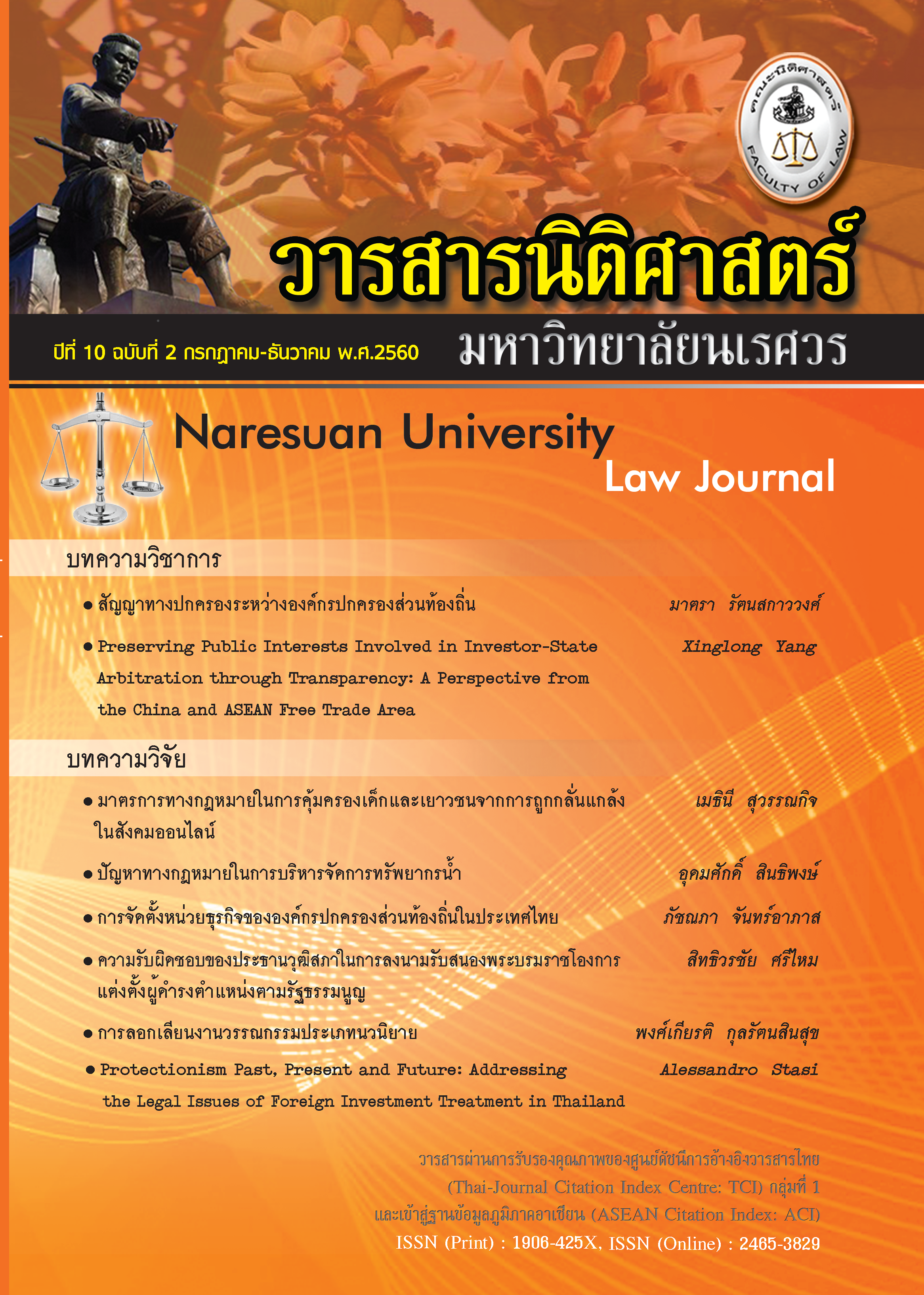มาตรการทางกฎหมายในการคุ้มครองเด็กและเยาวชนจาก การถูกกลั่นแกล้งในสังคมออนไลน์
Main Article Content
บทคัดย่อ
ในปัจจุบันพบว่าปัญหาเด็กและเยาวชนถูกกลั่นแกล้งในสังคมออนไลน์เป็นปัญหาสำคัญของประเทศไทย แต่การกลั่นแกล้งออนไลน์ (Cyber-Bullying) เป็นการกลั่นแกล้งรูปแบบใหม่โดยใช้เทคโนโลยีสารสนเทศและการสื่อสารเป็นเครื่องมือในการทำร้ายผู้อื่น จึงเกิดปัญหา หรือข้อจำกัดในการปรับใช้กฎหมายต่างๆ ที่มีอยู่ของไทย เช่น กฎหมายหมิ่นประมาท ละเมิด และพระราชบัญญัติว่าด้วยการกระทำความผิดเกี่ยวกับคอมพิวเตอร์ เมื่อศึกษาเปรียบเทียบกับกฎหมายของประเทศสหรัฐอเมริกาแล้วพบว่าประเทศสหรัฐอเมริกามีกฎหมายในระดับรัฐ (State Laws) ที่ออกแบบมาเพื่อแก้ไขปัญหาการกลั่นแกล้งออนไลน์โดยเฉพาะซึ่งสามารถแบ่งออกเป็น 2 ลักษณะ ดังนี้ (1) มาตรการเชิงนโยบาย (School Policies) ที่กำหนดไว้ในกฎหมายเกี่ยวกับการศึกษาของรัฐ (State Education Codes) และ (2) มาตรการการลงโทษทางอาญา จากการวิเคราะห์พบว่าทั้งสองมาตรการมีข้อดีและข้อเสียแตกต่างกัน งานวิจัยนี้จึงเสนอให้ประเทศไทย นำทั้งสองมาตรการมาปรับใช้โดยให้กำหนดมาตรการดังกล่าวไว้ในพระราชบัญญัติการศึกษาแห่งชาติ
Article Details
เอกสารอ้างอิง
Aujjareeya Chutinun. Laws in Relation to Child, Juvenile and Family Cases. Bangkok: Winyuchon, 2006. [In Thai]
Beale, Andrew V., and Kimberly R. Hall. “Cyberbullying: What School Administrators(and Parents) Can Do.” The Clearing House 81, no.1 (September/October 2007): 8-12.
Hayward, Join O. “Anti-Cyber Bullying Statutes: Threat to Student Free Speech.” Cleveland State Law Review 59, no.85 (2011): 88-89.
Hinduja, Sameer, and Justin W. Patchin. “State Cyber Bullying Laws: A Brief Review of State Cyberbullying Laws and Policies.” CyberBullying Research Center. Last modified n.d. Accessed 25 April 2017. https://cyberbullying.org/
Bullying-and-Cyberbullying-Laws.pdf.
Hinduja Sameer, and Justin W. Patchin. “Cyberbullying: An Exploratory Analysis of Factors Related to Offending and Victimization.” Deviant Behavior 29, no.2(2008): 129-156.
Jeed Settabut. The Principle of Civil Law: Torts. 8th ed. Bangkok: Thammasat, 2013. [In Thai]
Kanaphon Chanhom. The Explanation of Criminal Law: Offences 1. Bangkok: Winyuchon, 2015. [In Thai]
Kowalski, Robin M., and Susan P. Limber. “Electronic Bullying Among Middle School Students.” Journal of Adolescent Health 41, no.6 (2007): 22–30.
Lidsky, Lyrissa Barnett, and Andrea Garcia. “How not to Criminalize Cyberbullying.” Missouri Law Review 77, no.3 (Summer 2012): 693.
Lipton, Jacqueline D. “Combating Cyber-Victimization.” Berkeley Tech. L.J. 26, no.2(2011): 1103.
Manuel, Natasha Rose. “Cyber-Bullying: Its Recent Emergence and Needed Legislation to Protect Adolescent Victims.” Loy. J. Pub. Int. L. 13, no.1 (2011-2012): 219.
Meredith, Jessica P. “Combating Cyberbullying: Emphasizing Education over Criminalization.” Federal Communications Law Journal 63, no.1 (2010): 311.
Neiman, Samantha, Brandon Robers, and Simone Robers. “Bullying: A State of Affairs.” J.L & Educ. 41, no.4 (2012): 603.
Sanunkorn Sotthibandhu. The Explanation of Tort Law, Management of Affairs Without Mandate and Undue Enrichment. 6th ed. Bangkok: Winyochon, 2015. [In Thai]
Sarawut Pitiyasak. Information Technology Law. Bangkok: Nititham, 2012. [In Thai]
Strom, Paris S., and Robert D. Strom. “Cyberbullying by Adolescents: A Preliminary Assessment.” The Educational Forum 70, no.1 (2005): 21-31.
Supawadee Charoenwani. “Cyber Bullying: Impacts and Preventions in Adolescents.” Science and Technology Journal 25, no.4 (July-August 2017). [In Thai]
Taweekiet Meenakanit. Criminal Codes: References Edition. Bangkok: Winyuchon, 2012. [In Thai]
Taweekiet Meenakanit. The Explanation of Criminal Law: Specific and Petty Offences. 10th ed. Bangkok: Winyuchon, 2013. [In Thai]
U.S. Department of Education. “Analysis of State Bullying Laws and Policies.” Last modified n.d. Accessed April 25, 2017, https://www2.ed.gov/rschstat/eval/bullying/state-bullying-laws/state-bullying-laws.pdf.
Yud Sanguthai. Criminal Law: Part 2-3. 10th ed. Bangkok: Thammasat, 2003. [In Thai]


